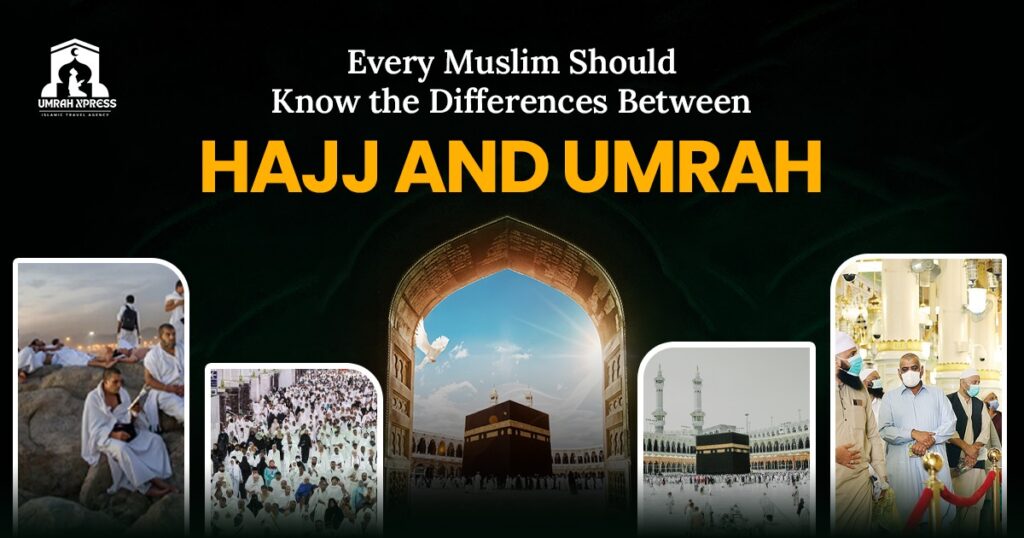Hajj and Umrah are both very important journeys in Islam. Through these sacred acts, Muslims seek Allah’s mercy, forgiveness, and blessings. Both bring peace to the heart and help a believer start fresh by leaving past sins behind.
Some people believe Hajj and Umrah are the same, but they are not. The difference comes in their importance, timing, and rituals. Every Muslim should know these differences to understand the value of each journey better.
What is Hajj?
Hajj is one of the five pillars of Islam and is compulsory for every Muslim who is economically and medically fit. It can only be performed at a fixed time, during the month of Dhul Hijjah.
Allah (S.W.T) says in the Quran:
وَأَتِمُّوا الْحَجَّ وَالْعُمْرَةَ لِلَّهِ
“Complete the Hajj and Umrah for Allah(S.W.T).”
(Surah Al-Baqarah: 196)
The rituals of Hajj go back to the tradition of Prophet Ibrahim (A.S.) and were established by our beloved Prophet Muhammad (P.B.U.H). Through Hajj, a Muslim renews their commitment to Allah(S.W.T) and submits their life to His will.
What is Umrah?
Umrah, known as the ‘minor pilgrimage,’ may be performed at any time of the year and offers Muslims a chance to cleanse their sins and seek spiritual peace. Unlike Hajj, which has specific dates, Umrah becomes a means for a believer to cleanse their soul and find peace in their heart. Umrah gives a Muslim the opportunity to seek forgiveness for past sins and attain a sense of spiritual calm. While it is not compulsory, it is highly recommended in Islam and carries great rewards.
Because of this, Muslims around the world, especially from the UK, look for Umrah packages 2026 UK and cheap Umrah packages from the UK to make their journey comfortable and stress-free.
Major Differences Between Hajj and Umrah
Hajj and Umrah are both sacred journeys in Islam, but they differ in many ways. Here are the key differences every Muslim should know:
- Importance: Umrah is a Sunnah act that brings great rewards but is not compulsory. Hajj is one of the five pillars of Islam and is mandatory to be performed once in a lifetime by every Muslim who is suitable
- Timing:Timing: Umrah may be performed at any time throughout the year, while Hajj is limited to specific dates, from the 8th to the 12th of Dhul Hijjah in the Islamic calendar.
- Rituals: Umrah includes Ihram, Tawaf around the Kaaba, Sa’i between Safa and Marwah, and shaving or trimming the hair. Hajj includes Ihram, standing at Arafah, staying at Muzdalifah, stoning the Jamarat, sacrifice, shaving, and Tawaf al-Ifadah.
- Duration: Umrah can usually be completed in just a few hours, while Hajj takes around 5–6 days.
- Pillars: The main acts that form the pillars of Umrah include entering the state of Ihram, performing Tawaf around the Kaaba, completing Sa’i between Safa and Marwah, and finishing with Tahallul (ending Ihram).
In summary, Hajj is a once-in-a-lifetime obligation with longer rituals, whereas Umrah is shorter, easier, and can be performed at any time of the year for great blessings.
How to Perform Umrah?
According to the Umrah guide, the holy journey is performed in the following steps:
- Enter the state of Ihram.
- Make Tawaf by going around the Kaaba seven times, keeping it to your left.
- Then walk between the hills of Safa and Marwah seven times.
- Perform Halq (shaving the head) or Taqsir (trimming the hair).
- Exit the state of Ihram to complete Umrah.
How to Perform Hajj?
The blessed pilgrimage of Hajj is carried out step by step as follows:
- Enter the state of Ihram and wear the prescribed white garments.
- On the 9th of Dhul Hijjah, spend the day at the plain of Arafah in ibadah and Prayer.
- After Arafah, move on to Muzdalifah and spend the night there.
- The next step is Rami, throwing Small stones at the three pillars in Mina, which represent Satan.
- Carry out Halq or Taqsir.
- Complete the pilgrimage by performing Tawaf al-Ifadah (the farewell circumambulation of the Kaaba).
The Significance of Hajj and Umrah
Even though there are differences in Manāsik and duration, both Hajj and Umrah hold deep Sacred importance in Islam. Every year, millions of Muslims from across the world travel to Saudi Arabia with eagerness and devotion to fulfill these sacred journeys. They are not just acts of worship but essential pillars of faith that bring believers closer to Allah(S.W.T).
Facilities for Elderly and Disabled Pilgrims
The Haram provides special arrangements for elderly and disabled pilgrims so they can perform their sacred worship with ease. Wheelchairs, electric scooters, smooth pathways, and medical services are all available to ensure every pilgrim can complete their manāsik with comfort and peace of mind.
Supplications and Prayers
Dua is the soul of worship. In both Hajj and Umrah, special prayers hold importance. They bring a pilgrim to Allah (S.W.T) and make the journey more peaceful and blessed. With Umrah Xpress, you get reliable Hajj and Umrah services in the UK that allow you to focus on your worship while we take care of the rest.
Prayers during Umrah
- Supplication for travel
- Prarys when seeing the Kaaba for the first time
- Prayer when entering Masjid al-Haram
- Intention (Niyyah) for Ihram
- Supplications during Tawaf
- Prayer when drinking Zamzam
- Dua while performing Sa’ee between Safa and Marwah
-
Prayer when leaving Masjid al-Haram
Prayers during Hajj
- Intention (Niyyah) for Ihram
- Supplication at Arafah
- Dua while stoning the Jamarat
- Prayer during sacrifice (Qurbani)
- Supplication at the time of Halq or Taqsir
These heartfelt supplications make every moment of the sacred journey more enlightening and spiritually fulfilling. Many Muslims, especially from the UK, look for cheap Umrah packages from the UK and book trusted Umrah packages to make their blessed journey comfortable and stress-free. With Umrah Xpress, all arrangements are made with care so you can give your full attention to your prayers and devotion.
FAQs
Q1. Should I perform Hajj or Umrah first?
Since Hajj is an obligation for every able Muslim, it should be given priority. Still, many Muslims choose to perform Umrah before Hajj as a way to prepare their hearts and strengthen their spiritual readiness.
Q2. What is the main difference between Hajj and Umrah?
Hajj is an essential obligation that every Muslim must fulfill once in their life, and it forms one of the five pillars of Islam. Umrah, by contrast, is a voluntary act of devotion that can be performed in any season of the year.
Q3. How are the timings of Hajj and Umrah different?
Hajj is tied to the days of Dhul Hijjah (8th–12th), but Umrah does not depend on dates and may be performed whenever a Muslim wishes.
Q4. What are the main rituals of Umrah and Hajj?
Umrah includes entering Ihram, performing Tawaf around the Kaaba, Sa’i between Safa and Marwah, and ending with Halq or Taqsir.




